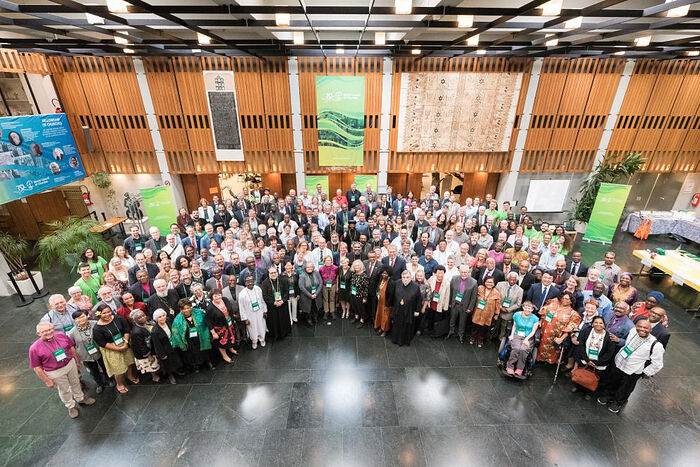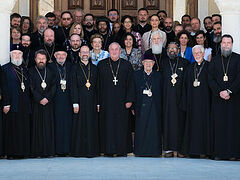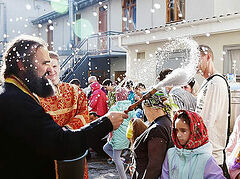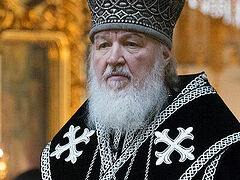Geneva, June 20, 2022
The Central Committee of the World Council of Churches, gathered in Geneva last week, issued a statement on the war in Ukraine.
The Committee “deplores” the war in Ukraine and “reiterates the appeal … for an immediate ceasefire to halt the death and destruction, and for dialogue and negotiations to secure a sustainable peace.”
The body also calls upon the WCC Acting General Secretary, Romanian Orthodox priest Fr. Ioan Sauca, to meet with Church leaders in Ukraine and Russia to “discern the things that make for peace and what is needed to urge their governments for an immediate ceasefire and peace negotiations.”
The Central Committee is the chief governing body of the WCC, “responsible for carrying out the policies adopted by the Assembly.” The session in Geneva included representatives of the Russian, and other Orthodox Churches.
The life, death, and teachings of Christ “point towards the peaceable Kingdom of God,” and in this light, the WCC “seeks the common good of all.”
All people, including those on both sides of the war, are made in the image of God, and we are called “to be transformed more completely into a global human community” that responds to the needs of every member.
All participants in the Central Committee sessions are “deeply affected by what has happened in Ukraine.”
The Committee states:
We are in Christian solidarity with all those who suffer in this conflict. Our hearts grieve that, after eight years of unresolved crisis and conflict in the eastern regions of Ukraine, on 24 February 2022 the Russian Federation launched an illegal invasion of its neighbour, a sovereign state. This tragic development represents a terrible failure of diplomacy, responsibility and accountability to international law.
The Committee further laments the death, destruction, and displacement that have come to Ukraine as a result of the war, including reports of possible war crimes and crimes against humanity. “Weapons cannot provide a solution to this crisis; the only real solution is to ‘seek peace and pursue it,’” the statement reads.
The conflict also threatens to destabilize international security and to plunge several countries around the world into famine, the Central Committee warns.
“Grave concerns are being raised in the ecumenical fellowship about any misuse of religious language to justify or support armed aggression, in sharp contrast to the Christian calling to be peacemakers. A fresh and critical analysis of the Christian faith in its relation to politics, the nation and nationalism is urgently called for.”
The Central Committee then praises the result of the Inter-Orthodox Pres-Assembly Consultation that took place in Cyprus, May 10-15, with His Eminence Metropolitan Hilarion, then of Volokolamsk, heading the Russian delegation. The participants expressed grave concern over the war in Ukraine and were “unanimous in condemning the wars,” and called upon all parties to do everything possible to establish peace and ensured safety.
The Committee emphasizes the important role of dialogue, noting that, “Division and exclusion is the antithesis of the purpose of our movement.” Thus, the Moscow Patriarchate is welcome to participate in the WCC, despite individual calls that it be excluded.
In conclusion, the Central Committee:
Deplores the illegal and unjustifiable war inflicted on the people and sovereign state of Ukraine. We lament the awful and continuing toll of deaths, destruction and displacement, of destroyed relationships and ever more deeply entrenched antagonism between the people of the region, of escalating confrontation globally, of increased famine risk in food insecure regions of the world, of economic hardship and heightened social and political instability in many countries.
Declares that war, with the killing and all the other miserable consequences it entails, is incompatible with God’s very nature and will for humanity and against our fundamental Christian and ecumenical principles, and rejects any misuse of religious language and authority to justify armed aggression.
Reiterates the appeal of the global fellowship of churches represented in the WCC for an end to this tragic war, for an immediate ceasefire to halt the death and destruction, and for dialogue and negotiations to secure a sustainable peace.
Appeals urgently to all sides in the conflict to respect the principles of international humanitarian law, including especially with regard to the protection of civilians and civilian infrastructure, and for the humane treatment of prisoners of war; we urge the exchange of prisoners of war and of the bodies of deceased combatants between the two sides.
Calls for a much greater investment by the international community in searching for and promoting peace, rather than in escalating confrontation and division.
Affirms the mandate and special role of the World Council of Churches in accompanying its member churches in the region and as a platform and safe space for encounter and dialogue in order to address the many pressing issues for the world and for the ecumenical movement arising from this conflict, and the obligation of its members to seek unity and together serve the world, and therefore urges members of the ecumenical fellowship in Russia and Ukraine to make use of this platform.
Commends the local churches, specialized ministries and all humanitarian organizations that are supporting the suffering people in all parts of Ukraine and receiving and caring for refugees fleeing from the war, and stresses the critical importance of the principle of humanitarian neutrality in this context.
Prays for all the victims of this conflict, in Ukraine, in the region and throughout the world, that their suffering may cease and that they may be consoled and restored to lives in safety and dignity, and assures them of the love and sympathy of the WCC fellowship of churches for them in their plight.
Calls upon our Christian brothers and sisters of the Russian and Ukrainian churches to use their voices to oppose the continuing deaths, destruction, displacement and dispossession of the people of Ukraine including their fellow Christians.
Asks the Acting General Secretary to lead a ‘Pilgrimage of Justice and Peace’ delegation to Kiev and Moscow to meet with the leadership of the churches in both places to discern the things that make for peace and what is needed to urge their governments for an immediate ceasefire and peace negotiations.
Further asks the Acting General Secretary to do all in his power for the forthcoming 11th WCC Assembly in Karlsruhe (31 August-8 September 2022) to contribute meaningfully to the search for peace through dialogue, for justice, human dignity and human rights – including by ensuring representation from Ukraine at the Assembly – and for the reconciliation and unity to which we are called by our Lord and Saviour Christ Jesus.
Follow OrthoChristian on Twitter, Vkontakte, Telegram, WhatsApp, MeWe, and Gab!





